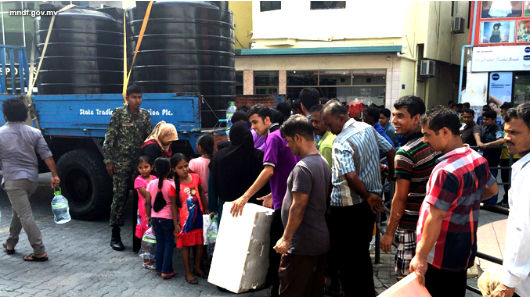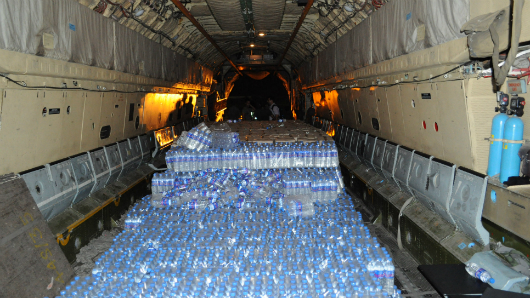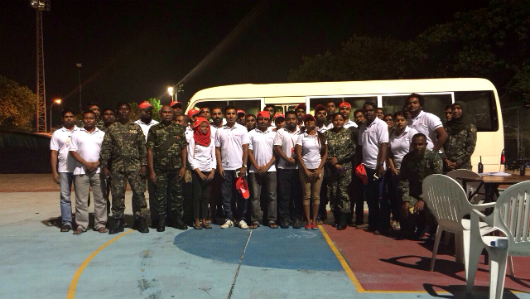President Abdulla Yameen will cut short his personal trip to Malaysia and return to the Maldives as the Malé water crisis continues into its third day.
Speaking to the press, President’s Office spokesperson Ibrahim Muaz said Yameen is expected to return tonight (December 6), cutting short his visit to Malaysia, where his son is said to be receiving medical treatment.
In Malé, Minister of Defence Colonel (retired) Mohamed Nazim has said that damage to the capital’s desalination plant is extensive, and could take between three days and a week to fully repair.
Water services to the capital Malé have been shut off after a crippling fire damaged crucial components of the island’s sole desalination facility – the Malé Water and Sewerages Company (MWSC) – leaving over 130,000 people without water for bathing, cleaning, and cooking.
“We hope to achieve 100 percent in about a week. God willing, we will be able to get a good result in about three days,” said Nazim, speaking on behalf of a presidential task force.
While 60 percent of the repairs have been completed, he continued, the fire had caused considerable damage to the water treatment plants, requiring extensive repairs.
“The damage to the water treatment plants’ panel board was a lot more than we had expected. Since the spare parts are not available in the Maldives, we must wait until we can acquire it,” said Nazim.
International aid
Fresh supplies of water continue to arrive from abroad – most notably from India – with distribution being carried out by the Maldives National Defence Force (MNDF) with the assistance of local NGOs alongside numerous private businesses.
The government has set up water distribution centers at schools and other public spaces, with each person allowed two 1.5 litre bottles, leading to the formation of large queues stretching around the capital. Local IT enthusiasts have developed a mobile app to enable residents to locate nearby distribution centres.
In addition, water is being pumped every six hours by MWSC for one hour periods although low water pressure means that many of the capital’s residents living in high rise apartments have received no supplies.
The MNDF has started distributing water through mobile tanks set up on military vehicles at various locations of the city, temporarily easing the queues at the water distribution centers.
President Yameen has declared today that all government offices will be closed on Sunday and Monday (December 7 and 8 ) as a result of the crisis, while calling on the public to remain calm and cooperative.
Meanwhile, the government of India continues to send supplies, having delivered over 150 tonnes of water via military aircraft in the past 24 hours. A second Indian vessel, with reverse osmosis facilities capable of delivering 200 tonnes of water daily, is expected to arrive today with 800 tonnes of water.
The Chinese government has sent 12 tonnes of water aboard a Mega Maldives flight from Beijing, with the foreign ministry also reporting Chinese naval vessels being en route to the capital.
Yesterday, Sri Lanka started sending water to the Maldives via Sri Lankan Airlines flights, while the UN in Maldives has said it will distribute 180 tonnes of rainwater stored under its premises on Buruzu Magu.
Local efforts
The Maldives Red Crescent (MRC) and teams of volunteers from telecoms provider Ooredoo have been been assisting security services, with Head of Planning Shabeen Ali telling Minivan News that people waiting for water have been “very calm and disciplined”.
Detailing efforts, MRC spokesperson Safa Musthafa explained that the MRC has mobilised more than 450 volunteers, requesting more people to join the distribution teams by reporting to Majeedhihyaa school which is operating as the organisation’s headquarters.
Safa also revealed that 5 tonnes of bottled water would be shipped tomorrow under the disaster and emergency relief fund set up by the International Federation of Red Cross and Red Crescent Societies.
Meanwhile, the Human Rights Commission of the Maldives (HRCM) has commended the state’s quick response to the water crisis, though it noted concern over reports of discrimination against migrant workers.
Human rights and pro-democracy NGO Maldivian Democracy Network (MDN) also voiced concern over reported discrimination, though volunteers at distribution centres have said the government has reversed the initial requirement of an official ID to collect water.
Rumours of discrimination against migrant workers have circulated on social media with some members of the public telling Minivan News of a fight breaking out at Galolhu stadium last night after locals demanded priority over migrant workers in the queue.
MDN also raised concerns over the absence of a backup plan, urging authorities “to take lessons from this incident and come up with a backup plan for Malé and other islands”.
Former President Nasheed has called for an immediate inquiry into the causes of the crisis, questioning the government’s preparedness levels as well as President Yameen’s absence from the country.
Malé City Council – originally mandated with the provision of water services under the 2010 Decentralisation Act – has also raised the issue of responsibility for the crisis. A council statement noted that its offer of assistance had been rejected by the government’s task force.
International coverage
The BBC reports ‘Maldives in Water Crisis’, while a number of outlets, including the Daily Mail and Al Jazeera, have chosen to focus on the small number of isolated incidents involving violence.
Government minister Mohamed Shareef was quoted by Reuters as saying that a state of emergency has been declared – soon picked up by the AFP – though this has subsequently been denied by the foreign ministry.
The Diplomat noted that the crisis represented an opportunity for India to demonstrate its capacity as “first responder” in time of crisis, as well as suggesting that a prolonged period without water might lead to “grave economic consequences and a broader political crisis”.
In Indian media, the New Indian Express ran the headline ‘IAF Airlifts Water Bottles to Quench Maldives’ Thirst’, while the Hindu has led with ‘How India staved off Maldives’ water crisis’.
Related to this story
Indian aircraft arrives to ease Malé water crisis
Malé water supply cut after fire at MWSC
Nasheed calls for inquiry into MWSC fire


